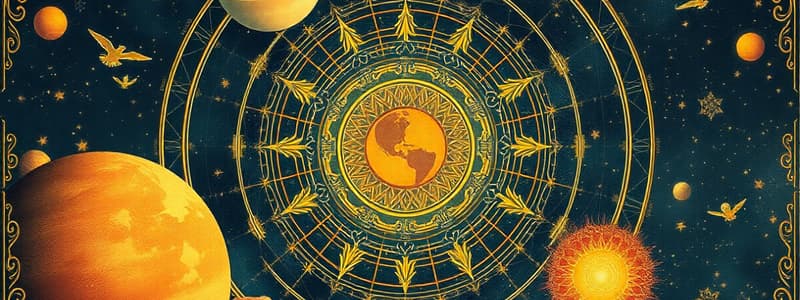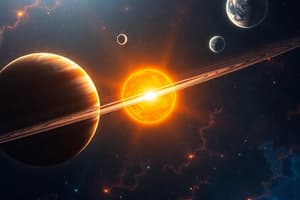Podcast
Questions and Answers
What unique characteristic does Saturn have compared to other planets in the solar system?
What unique characteristic does Saturn have compared to other planets in the solar system?
- It has rings made entirely of ice.
- It is less dense than water. (correct)
- It is the largest planet in the solar system.
- It is the hottest planet in the solar system.
Which planet has the fastest winds in our solar system?
Which planet has the fastest winds in our solar system?
- Mars
- Jupiter
- Neptune (correct)
- Saturn
What is the approximate gravity on Mars compared to Earth?
What is the approximate gravity on Mars compared to Earth?
- Twice that of Earth
- Approximately one-third of that on Earth (correct)
- One-half of that on Earth
- Equal to that of Earth
What is the temperature range of the crater floors at the Moon’s south pole?
What is the temperature range of the crater floors at the Moon’s south pole?
Which moon is recognized as the most volcanically active body in our solar system?
Which moon is recognized as the most volcanically active body in our solar system?
What notable feature characterizes Neptune's atmosphere?
What notable feature characterizes Neptune's atmosphere?
How much power does the radio signal from a spacecraft use to communicate with Earth?
How much power does the radio signal from a spacecraft use to communicate with Earth?
What unique feature does Io's surface resemble due to volcanic activity?
What unique feature does Io's surface resemble due to volcanic activity?
What makes Ceres unique among dwarf planets?
What makes Ceres unique among dwarf planets?
What is the average temperature on Venus?
What is the average temperature on Venus?
How does the length of a day on Venus compare to a year?
How does the length of a day on Venus compare to a year?
What would you need to wait for after experiencing a day on Venus?
What would you need to wait for after experiencing a day on Venus?
What can be said about the total mass of known asteroids in the solar system relative to the Moon?
What can be said about the total mass of known asteroids in the solar system relative to the Moon?
What is the fastest planet in our solar system?
What is the fastest planet in our solar system?
How long is a year on Mercury in Earth days?
How long is a year on Mercury in Earth days?
What is Europa covered in?
What is Europa covered in?
Which is the largest canyon system in the solar system?
Which is the largest canyon system in the solar system?
What is Ceres in the context of the asteroid belt?
What is Ceres in the context of the asteroid belt?
How high would a 3-foot Axel jump on Europa be compared to on Earth?
How high would a 3-foot Axel jump on Europa be compared to on Earth?
What type of equipment does the Deep Space Network use to detect signals from space?
What type of equipment does the Deep Space Network use to detect signals from space?
How does Mercury's speed compare to Earth's?
How does Mercury's speed compare to Earth's?
Flashcards are hidden until you start studying
Study Notes
Earth's Moon
- Craters at the moon's south pole may be the frostiest locale in the entire solar system
- Daytime temperatures may never rise above minus 238 degrees Celsius (minus 397 degrees Fahrenheit)
Mars
- Mars' gravity is approximately one-third that of Earth's
- The largest canyon system in the solar system is Valles Marineris on Mars
- Valles Marineris is more than 4,000 kilometers (3,000 miles) long, enough to stretch from California to New York
- It is nine times as long and four times as deep as Earth’s Grand Canyon
- The temperature at the Martian equator would be warm at your feet but freezing cold at your head
Jupiter
- Jupiter's moon Io is the most volcanically active body in our solar system
- More than 1,300 Earths would fit into Jupiter’s vast sphere
- Europa is one of the four largest moons of Jupiter
- Covered in ice, including some smooth ice
- A 3-foot (about 1 meter) Axel jump on this moon would take you 22 feet (more than 6 meters) high
Saturn
- Saturn is the only planet in our solar system that is less dense than water
- It could float in a bathtub if anybody could build a bathtub big enough
Neptune
- Neptune’s winds are the fastest in the solar system, reaching 2,575 kilometers per hour (1,600 miles per hour)
- Neptune's giant, spinning storms could swallow the whole Earth
Mercury
- Mercury is the fastest planet in our solar system
- It zips around our Sun at an average of 172,000 kilometers per hour (107,000 miles per hour) — about 65,000 kph (40,000 mph) faster than Earth
- A year on Mercury is equal to 88 Earth days
Venus
- The average temperature on Venus is more than 480 degrees Celsius (about 900 degrees Fahrenheit)
- A Venus day is approximately 243 Earth days long
- A day on Venus is longer than its year
Spacecraft Communication
- The radio signal that a spacecraft uses to contact Earth has no more power than a refrigerator light bulb
- To detect those tiny signals from space, the Deep Space Network uses dish antennas with diameters of up to 70 meters (230 feet).
Asteroids
- Ceres is the largest, most massive body in the main asteroid belt between Mars and Jupiter
- Ceres is the smallest of the dwarf planets
- If you could lump together all the thousands of known asteroids in our solar system, their total mass wouldn’t even equal 10 percent of the mass of Earth’s Moon
Studying That Suits You
Use AI to generate personalized quizzes and flashcards to suit your learning preferences.




